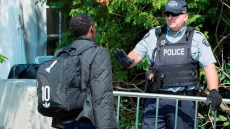“The COVID-19 pandemic challenges our health, our economy and our way of life. People and businesses urgently need support,” said Premier John Horgan. “Our action plan focuses on services to protect people’s health and safety, gives immediate relief to people and businesses, and plans for B.C.’s economic recovery over the long term.”
The COVID-19 Action Plan is government’s first step to provide relief to people and businesses in British Columbia. The plan dedicates $2.8 billion to help people and fund the services they need to weather the crisis; $2.2 billion will provide relief to businesses and help them recover after the outbreak.
B.C.’s COVID-19 Action Plan builds on the federal government’s COVID-19 economic plan and boosts supports for British Columbians who are worried about paying their bills and staying afloat.
Watch live: I'll be joined by @carolejames as we announce our first steps to deliver urgent support for people and businesses with BC's COVID-19 Action Plan. https://t.co/QAYdr33IDx
— John Horgan (@jjhorgan) March 23, 2020
Supporting people and the services they rely on
The plan includes immediate measures to help individuals and families cope with potential illness, financial strain or precarious employment. It also adds funding to key services, such as health care, housing and social services, to make sure they continue to support British Columbians and help contain the spread of COVID-19.
“While this crisis continues, we need to make sure that people are kept safe and that vital services are available to British Columbians,” said Carole James, Minister of Finance. “That means making sure people can pay their bills, stay safe in their homes and provide for their families during this extraordinary time.”
Of the $2.8 billion allocated to ensure people have the services and support they need during this difficult time, the B.C. government is dedicating $1.1 billion to boost the income of people affected by COVID-19.
A new B.C. Emergency Benefit for Workers will provide a tax-free $1,000 payment to British Columbians whose ability to work has been affected by the outbreak. The benefit will be a one-time payment for British Columbians who receive federal Employment Insurance (EI), or the new federal Emergency Care Benefit or Emergency Support Benefit as a result of COVID-19 impacts.
This includes workers who have been laid-off, who are sick or quarantined, parents with sick children, parents who stay at home from work while child care centres and schools are closed, and those caring for sick family members, such as an elderly parent. The workers can be EI-eligible and non-EI eligible, such as the self-employed. The benefit will be paid to B.C. residents, in addition to their federal income supports.
The COVID-19 Action Plan takes further steps to boost income supports by increasing and expanding the B.C. Climate Action Tax Credit in July 2020.
As many as 86% of British Columbians will see some extra money from this enhancement. Eligible families of four will receive up to $564 and eligible individuals will receive up to $218 in an enhanced payment. This boosts the regular climate action tax credit payment of up to $112.50 per family of four and up to $43.50 per adult.
Together, the B.C. Emergency Benefit for Workers and the enhanced B.C. Climate Action Tax Credit will complement federal income supports and help people who are struggling with job loss, reduced income or increased costs through the immediate crisis.
The Province is focused on keeping people safe, healthy and supported throughout the COVID-19 pandemic. To support that work, the action plan provides $1.7 billion for the critical services British Columbians need.
The $1.7 billion includes investments in housing and shelter supports, income and disability assistance programs and crucial health services, such as funding for the BC Centre for Disease Control hotline, quarantine costs, lab tests and work underway at the First Nations Health Authority and the United Way’s Better at Home program for seniors.
To support non-profits, service delivery agencies and child care providers, the Province will continue to provide funding even if these agencies are closed or their regular operations have been disrupted. Licensed child care providers staying open will receive enhanced funding to keep operations going. These centres are eligible to receive seven times their average monthly operating funding from government, which is expected to cover approximately 75% of a group facility's average monthly operating expenses.
To help people with B.C. student loans, the Province is freezing B.C. student loan payments for six months, starting March 30, 2020. Federal student loan payments are being frozen as well.
British Columbians needing more time to pay their bills can also apply to existing payment deferral programs at ICBC and BC Hydro. ICBC is extending deferrals to up to 90 days. People dealing with job loss, illness or loss of wages due to COVID-19 may also qualify for BC Hydro’s Customer Crisis Fund grant program for up to $600.
Supporting businesses
British Columbia has a strong economic foundation, but COVID-19 is having impacts across the country and around the world. Every aspect of B.C.’s economy will be touched by this pandemic. The COVID-19 Action Plan will help businesses get through the immediate crisis and lay the groundwork needed to get businesses back on their feet once the crisis is over.
Effective immediately, businesses with a payroll over $500,000 can defer their employer health tax payments until Sept. 30, 2020. Businesses with a payroll under this threshold are already exempt from the tax.
In addition to the employer health tax, the Province is extending tax filing and payment deadlines for the provincial sales tax (PST), municipal and regional district tax, tobacco tax, motor fuel tax and carbon tax until Sept. 30, 2020. The scheduled April 1 increase to the provincial carbon tax, as well as the new PST registration requirements on e-commerce and the implementation of PST on sweetened carbonated drinks, will be delayed and their timing will be reviewed by Sept. 30, 2020.
Business and light- and major-industry property classes will see their school tax cut in half. This will provide $500 million in immediate relief for business that own their property and allow commercial landlords to immediately pass savings on to their tenants in triple-net leases.
In the longer term, the recovery plan will dedicate funding to particularly hard-hit parts of the economy, such as the tourism, hospitality and culture sectors. The B.C. government is partnering with business and labour leaders to build an economic stimulus plan. The Province has allocated $1.5 billion for economic recovery.


